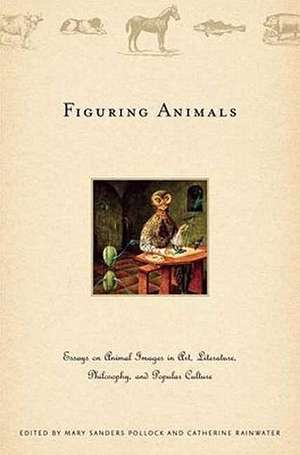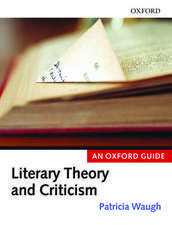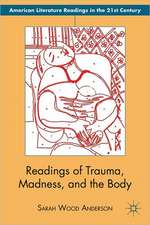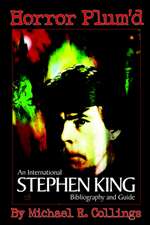Figuring Animals: Essays on Animal Images in Art, Literature, Philosophy and Popular Culture
Editat de M. Pollock, C. Rainwateren Limba Engleză Hardback – 31 ian 2005
Preț: 646.62 lei
Preț vechi: 760.73 lei
-15% Nou
Puncte Express: 970
Preț estimativ în valută:
123.73€ • 134.82$ • 104.26£
123.73€ • 134.82$ • 104.26£
Carte tipărită la comandă
Livrare economică 23 aprilie-07 mai
Preluare comenzi: 021 569.72.76
Specificații
ISBN-13: 9781403965127
ISBN-10: 1403965129
Pagini: 304
Ilustrații: XIII, 292 p.
Dimensiuni: 155 x 235 x 23 mm
Greutate: 0.59 kg
Ediția:2005
Editura: Palgrave Macmillan US
Colecția Palgrave Macmillan
Locul publicării:New York, United States
ISBN-10: 1403965129
Pagini: 304
Ilustrații: XIII, 292 p.
Dimensiuni: 155 x 235 x 23 mm
Greutate: 0.59 kg
Ediția:2005
Editura: Palgrave Macmillan US
Colecția Palgrave Macmillan
Locul publicării:New York, United States
Cuprins
Introduction PART 1: THE SOCIAL ANIMAL Lost Dog: The Silent Authority of the Animal Face; H.P.Steeves Ursus Americanus: The Idea of a Bear; M.Dylan Fox Digging and Leveling in Adam's Garden: Women and the International Cat Fancy; S.E.Jones PART 2: THE OBSERVED AND THE OBSERVER Animal Testimony in Renaissance Art: Mary's Annunciation and Paul's Conversion; W.J.Scheik Strange Yet 'Familiar': Cats and Birds in Remedios Varo's Artistic Universe; N.Vosburg Who's Looking: The Animal Gaze in the Fiction of Brigitte Kronauer and Clarice Lispector; J.Ittner PART 3: ART AND SCIENCE Burning Out the Animal: The Failure of Enlightenment Purification in H.G. Wells's The Island of Doctor Moreau ; C.Rohman Ouida's Rhetoric of Empathy: A Case Study in Victorian Anti-Vivisection Narrative; M.S.Pollock PART 4: DIFFERENCE AND DESIRE The Black Stallion in Print and Film; L.Addison 'Who Are the Bander-log?': The Child and the Animal in Rudyard Kipling's Mowgli Stories and Ursula LeGuin's 'Buffalo Gals Won't You Come Out Tonight?' ; C.Powici To the Other: The Animal and Desire in Michael Field's Whymchow: Flame of Love ; D. Banash 'Identification With the Animals': Language, Subjectivity, and the Animal-Politics of Atwood's Surfacing ; R.McKay PART 5: THEORIES OF THE OTHER Sensory Experience as Consciousness in Literary Representations of Animal Minds; J.A.Smith Human-Animal Affiliation in Modern Popular Film; T.Gadd Who May Speak for the Animals?: Deep Ecology in Linda Hogan's Power and A.A. Carr's Eye Killers ; C.Rainwater Contributors Acknowledgments
Recenzii
"This is a fascinating, important collection, guaranteed to change the way you think about cultural representations of animals. Figuring Animals cuts across disciplinary and genre boundaries to examine the causes, meanings, and consequences of how we conceive of 'other' species. I can't imagine a more diverse and interesting collection of essays on the depiction of animals in art, language, philosophy, and culture than those assembled here." - Christian Weisser, Florida Atlantic University
"Figuring Animals is, no matter the measure, a striking collection of essays. Pollock and Rainwater have burrowed beneath the thick skin of our assumptions and depictions, and what they reveal to the reader is not particularly pretty, although it is always illuminating. Animals, as they put it, are 'our most persistent other,' and this text reframes the question of otherness in provocative ways. Humans coopt animal independence, scoff at or revere the possibility of animal emotion, experiment, and adore. Examining our figuring of animals, from the brutal to the anthropomorphic, Pollock and Rainwater demand that we reconsider the relationship. If not for the animals' sake, they seem to say, then for our own." - Megan O'Neill, Associate Professor of English, Stetson University
"Figuring Animals is, no matter the measure, a striking collection of essays. Pollock and Rainwater have burrowed beneath the thick skin of our assumptions and depictions, and what they reveal to the reader is not particularly pretty, although it is always illuminating. Animals, as they put it, are 'our most persistent other,' and this text reframes the question of otherness in provocative ways. Humans coopt animal independence, scoff at or revere the possibility of animal emotion, experiment, and adore. Examining our figuring of animals, from the brutal to the anthropomorphic, Pollock and Rainwater demand that we reconsider the relationship. If not for the animals' sake, they seem to say, then for our own." - Megan O'Neill, Associate Professor of English, Stetson University
Notă biografică
MARY POLLOCK is Professor of English at Stetson University in Florida, USA.
CATHERINE RAINWATER is Professor of English at St. Edward's University in Texas, USA.
CATHERINE RAINWATER is Professor of English at St. Edward's University in Texas, USA.

















